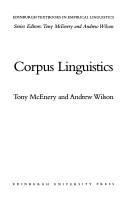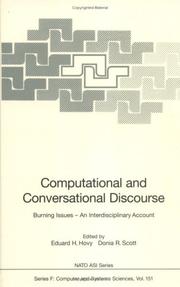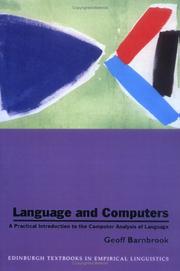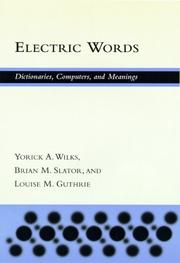| Listing 1 - 10 of 15 | << page >> |
Sort by
|
Book
ISBN: 2864603012 9782864603016 Year: 1996 Publisher: Paris Didier Erudition
Abstract | Keywords | Export | Availability | Bookmark
 Loading...
Loading...Choose an application
- Reference Manager
- EndNote
- RefWorks (Direct export to RefWorks)

ISBN: 3823350803 9783823350804 Year: 1996 Volume: 415 Publisher: Tübingen Narr
Abstract | Keywords | Export | Availability | Bookmark
 Loading...
Loading...Choose an application
- Reference Manager
- EndNote
- RefWorks (Direct export to RefWorks)

ISBN: 0748604820 9780748604821 Year: 1996 Volume: *1 Publisher: Edinburgh Edinburgh University Press
Abstract | Keywords | Export | Availability | Bookmark
 Loading...
Loading...Choose an application
- Reference Manager
- EndNote
- RefWorks (Direct export to RefWorks)
Mathematical linguistics --- Automatic language processing --- Computational linguistics --- Computer linguistics --- Computerlinguïstiek --- Language and languages -- Data processing --- Language data processing --- Linguistics -- Data processing --- Linguistique -- Informatique --- Linguistique -- Traitement des données --- Linguistique computationnelle --- Linguistique informatique --- Linguistique informatisée --- Natural language processing (Linguistics) --- Taalwetenschap -- Gegevensverwerking --- --Corpus linguistique --- --Méthodologie --- --Computational linguistics --- Discourse analysis --- Methodology --- Data processing --- Methodology. --- Data processing. --- Linguistic research --- Corpus linguistique --- Méthodologie --- Computational linguistics - Methodology --- Discourse analysis - Data processing

ISBN: 3540609482 3642082440 3662032937 Year: 1996 Volume: 151
Abstract | Keywords | Export | Availability | Bookmark
 Loading...
Loading...Choose an application
- Reference Manager
- EndNote
- RefWorks (Direct export to RefWorks)
Mathematical linguistics --- Artificial intelligence. Robotics. Simulation. Graphics --- Pragmatics --- Analyse du discours --- Automatic language processing --- Computational linguistics --- Computer linguistics --- Computerlinguïstiek --- Discourse analysis --- Discourse grammar --- Language and languages -- Data processing --- Language data processing --- Linguistics -- Data processing --- Linguistique -- Informatique --- Linguistique -- Traitement des données --- Linguistique computationnelle --- Linguistique informatique --- Linguistique informatisée --- Natural language processing (Linguistics) --- Taalwetenschap -- Gegevensverwerking --- Tekstgrammatica --- Tekstlinguïstiek --- Text analysis --- Text grammar --- Computational linguistics. --- Discourse analysis.

ISBN: 1575860287 Year: 1996 Publisher: Stanford (Calif.): CSLI
Abstract | Keywords | Export | Availability | Bookmark
 Loading...
Loading...Choose an application
- Reference Manager
- EndNote
- RefWorks (Direct export to RefWorks)
Ambiguity. --- Categorial grammar. --- Computational linguistics. --- Semantics. --- Ambiguity --- Categorial grammar --- Computational linguistics --- Semantics --- Formal semantics --- Semasiology --- Semiology (Semantics) --- Comparative linguistics --- Information theory --- Language and languages --- Lexicology --- Meaning (Psychology) --- Automatic language processing --- Language data processing --- Linguistics --- Natural language processing (Linguistics) --- Applied linguistics --- Cross-language information retrieval --- Mathematical linguistics --- Multilingual computing --- Grammar, Categorial --- Grammar, Comparative and general --- Data processing

ISBN: 0748607854 0748608486 9780748607853 Year: 1996 Publisher: Edinburgh : Edinburgh University Press,
Abstract | Keywords | Export | Availability | Bookmark
 Loading...
Loading...Choose an application
- Reference Manager
- EndNote
- RefWorks (Direct export to RefWorks)
Langage --- --Analyse informatique --- --Linguistique computationnelle --- --Computational linguistics --- Mathematical linguistics --- Computational linguistics. --- Computational linguistics --- Linguistique informatique --- Computerlinguïstiek. --- Corpus linguistics. --- Taalanalyse --- Computergebruik. --- #KVHA:Computerlinguistiek --- Automatic language processing --- Language and languages --- Language data processing --- Linguistics --- Natural language processing (Linguistics) --- Data processing --- Applied linguistics --- Cross-language information retrieval --- Multilingual computing --- Analyse informatique --- Linguistique computationnelle --- COMPUTATIONAL LINGUISTICS --- COMPUTER ANALYSIS
Book
ISSN: 03446778 ISBN: 3484311681 3110941015 9783484311688 Year: 1996 Volume: 168 Publisher: Tübingen Niemeyer
Abstract | Keywords | Export | Availability | Bookmark
 Loading...
Loading...Choose an application
- Reference Manager
- EndNote
- RefWorks (Direct export to RefWorks)
In der Phraseologieforschung, der Fremdsprachendidaktik und der Metalexikographie werden Kollokationen zumeiste als Elemente der langue aufgefaßt und im Graubereich zwischen freien Wortverbindungen und Phrasemen angesiedelt. Wenig Gemeinsamkeiten mit dieser Auffassung zeigt die kollokationstheorie des britischen Kontextualismus, die zum Ausgangspunkt der vorliegenden Arbeit genommen wurde. Kollokationen in diesem Sinne basieren, gemäß dem kontextualistischen Postulat, nur den tatsächlichen Sprachgebrauch zu untersuchen, auf Elementen der parole. Sie werden zu Zwecken lexikalischer Analyse eigens gebildet und bestehen aus beliebigen Zusammenfassungen sprachlicher Einheiten, die in konkreten Texten in syntagmatischer Nähe zueinander vorkommen. Ziel der Arbeit ist es, die Kollokationstheorie des Kontextualismus in ein operationales lexikalisches Sprachanalysenmodell, welches auch für die maschinelle Sprachverarbeitung nutzbar ist, umzusetzen. Dieses Sprachanalysemodell soll insbesondere dazu dienen, die maschinelle Disambiguierung im Falle polysemer oder homonymer Wörter sowie die maschinelle Identifizierung von Phrasemen - Aufgaben, die die maschinelle Sprachverarbeitung noch immer vor große Probleme stellen - handhabbarer zu machen. Bisherige Problemlösungsstrategien bestanden vor allem darin, entweder Restriktionen für die Textproduktion vorzusehen oder spezielle Basen zur Repräsentation sprachexternen Wissens zu kompilieren. Das hier entwickelte Analysemodell stützt sich dagegen auf die Annahme, daß die Identifizierung und Charakterisierung sprachlicher Einheiten allein auf der Grundlage des kollokativen Verhaltens von Formativen in konkreten Texten, wie es sich anhand von Häufigkeit und Signifikanz ihres Miteinandervorkommens bestimmen läßt, geleistet werden kann. Die Miteinbeziehung von Wissen über außersprachliche Entitäten wird somit nicht als notwendig erachtet. Endergebnis eines Analyseverfahrens der hier projektierten Form ist ein lexikalisches Netz, das im Anschluß als Datenbasis für vielerlei Arten von Textgenerierungs- und Textanalyseaufgaben genutzt werden kann.
-Computational linguistics --- Semantic prosody --- Computational linguistics. --- Discourse analysis --- Collocation (Linguistics) --- Lexicology --- Data processing. --- Computational linguistics --- Automatic language processing --- Language and languages --- Language data processing --- Linguistics --- Natural language processing (Linguistics) --- Data processing --- Semantics --- Applied linguistics --- Cross-language information retrieval --- Mathematical linguistics --- Multilingual computing --- Discourse analysis - Data processing. --- Collocation (Linguistics) - Data processing. --- Lexicology - Data processing.

ISBN: 0262611228 0262112183 0585021198 0262277239 9780262277235 9780585021195 9780262112185 9780262611220 Year: 1996 Publisher: Cambridge, Mass. : MIT Press,
Abstract | Keywords | Export | Availability | Bookmark
 Loading...
Loading...Choose an application
- Reference Manager
- EndNote
- RefWorks (Direct export to RefWorks)
Mathematical linguistics --- Mathematical statistics --- Computational linguistics --- Linguistics --- Linguistique informatique --- Linguistique --- Congresses --- Statistical methods --- Congrès --- Méthodes statistiques --- -Linguistics --- -Automatic language processing --- Language and languages --- Language data processing --- Natural language processing (Linguistics) --- Applied linguistics --- Cross-language information retrieval --- Multilingual computing --- Linguistic science --- Science of language --- -Congresses --- Data processing --- Languages & Literatures --- Philology & Linguistics --- Congrès --- Méthodes statistiques --- Statistical methods&delete& --- Computational linguistics - Congresses --- Linguistics - Statistical methods - Congresses
Book
ISSN: 09297316 ISBN: 9027216193 9786613174468 1283174464 9027283559 9789027283559 1556197004 9781556197000 9789027216199 9781283174466 6613174467 Year: 1996 Volume: 18 Publisher: Amsterdam ; Philadelphia : J. Benjamins Pub. Co.,
Abstract | Keywords | Export | Availability | Bookmark
 Loading...
Loading...Choose an application
- Reference Manager
- EndNote
- RefWorks (Direct export to RefWorks)
A state-of-the-art volume highlighting the links between lexicography, terminology, language for special purposes (LSP) and translation and Machine Translation, that constitute the domain of Language Engineering.Part I: Terminology and Lexicography. Takes us through terminological problems and solutions in Europe, the former Soviet Union and Egypt.Part II focuses on LSP for second language learners and lexical analysis.Part III treats translator training in a historical context, as well as new methods from cognitive and corpus linguistics.Part IV is about the applicatio
Automatisch vertalen. --- Computerlinguïstiek. --- Terminologieleer. --- Terminologische databanken. --- #KVHA:Vertaalwetenschap --- Terms and phrases. --- Sublanguage. --- Translating and interpreting. --- Computational linguistics. --- Automatic language processing --- Language and languages --- Language data processing --- Linguistics --- Natural language processing (Linguistics) --- Applied linguistics --- Cross-language information retrieval --- Mathematical linguistics --- Multilingual computing --- Interpretation and translation --- Interpreting and translating --- Literature --- Translation and interpretation --- Translators --- Language for special purposes --- Restricted language --- Special language --- Discourse analysis --- Semantics --- Register (Linguistics) --- Terminology --- Names --- Sublanguage --- Allusions --- Data processing --- Translating --- Variation --- Linguistique --- Traduction --- Informatique

ISBN: 0262231824 0262286246 0585027188 9780262286244 9780585027180 9780262231824 Year: 1996 Volume: *1 Publisher: Cambridge (Mass.) : MIT press,
Abstract | Keywords | Export | Availability | Bookmark
 Loading...
Loading...Choose an application
- Reference Manager
- EndNote
- RefWorks (Direct export to RefWorks)
The use of computers to understand words continues to be an area of burgeoning research. Electric Words is the first general survey of and introduction to the entire range of work in lexical linguistics and corpora -- the study of such on-line resources as dictionaries and other texts -- in the broader fields of natural-language processing and artificial intelligence. The authors integrate and synthesize the goals and methods of computational lexicons in relation to AI's sister disciplines of philosophy, linguistics, and psychology. One of the underlying messages of the book is that current research should be guided by both computational and theoretical tools and not only by statistical techniques -- that matters have gone far beyond counting to encompass the difficult province of meaning itself and how it can be formally expressed. Electric Words delves first into the philosophical background of the study of meaning, specifically word meaning, then into the early work on treating dictionaries as texts, the first serious efforts at extracting information from machine-readable dictionaries (MRDs), and the conversion of MRDs into usable lexical knowledge bases. The authors provide a comparative survey of worldwide work on extracting usable structures from dictionaries for computational-linguistic purposes and a discussion of how those structures differ from or interact with structures derived from standard texts (or corpora). Also covered are automatic techniques for analyzing MRDs, genus hierarchies and networks, numerical methods of language processing related to dictionaries, automatic processing of bilingual dictionaries, and consumer projects using MRDs.
Mathematical linguistics --- Artificial intelligence. Robotics. Simulation. Graphics --- Automatic language processing --- Computational linguistics --- Computer linguistics --- Computerlinguïstiek --- Language and languages -- Data processing --- Language data processing --- Langue naturelle--Traitement des données (Informatique) --- Linguistics -- Data processing --- Linguistique -- Informatique --- Linguistique -- Traitement des données --- Linguistique computationnelle --- Linguistique informatique --- Linguistique informatisée --- Natural language processing (Computer science) --- Natural language processing (Linguistics) --- Natuurlijke taal--Gegevensverwerking (Informatica) --- Taalwetenschap -- Gegevensverwerking --- NLP (Computer science) --- Artificial intelligence --- Electronic data processing --- Human-computer interaction --- Semantic computing --- Language and languages --- Linguistics --- Applied linguistics --- Cross-language information retrieval --- Multilingual computing --- Data processing --- Computational linguistics. --- Natural language processing (Computer science). --- Computers --- Use of --- Natural language --- LINGUISTICS & LANGUAGE/General
| Listing 1 - 10 of 15 | << page >> |
Sort by
|

 Search
Search Feedback
Feedback About
About Help
Help News
News